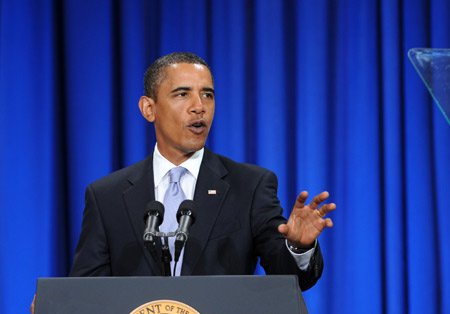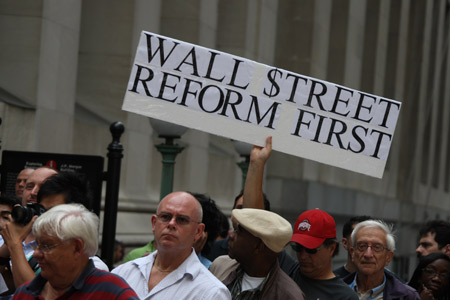Obama pushes for financial regulation reform
US President Barack Obama, speaking one year after Lehman Brothers Holdings Inc.'s collapse, reiterated on Monday his plan to overhaul the financial regulation system and urged the Congress to pass the reform as soon as possible.
At Federal Hall, which is located on Wall Street and just across the New York Stock Exchange, Obama urged the financial industry to support his new financial rules and avoid a return to the practices of excessive risk taking. Obama also called for global coordination in financial oversight and protecting economic recovery.
 |
|
US President Barack Obama speaks about the global financial crisis on Wall Street at Federal Hall in New York City Sept. 14, 2009. [Gu Xinrong/Xinhua] |
Lehman, the fourth largest US investment bank, filed for bankruptcy on Monday, Sept. 15, 2008, which triggered a financial crisis that spread around the world and resulted in more than 1.6 trillion US dollars in losses and write downs by financial institutions.
Addressing an audience consisting of his economic team, financial executives and consumer advocates, Obama said it was a "collective failure of responsibility in Washington, on Wall Street, and across America that led to the near-collapse of the financial system one year ago."
 |
|
An onlooker holds up a slogan outside the historic Federal Hall where US President Barack Obama is speaking in the heart of Wall Street in New York Sept. 14, 2009. Obama, marking a year since Lehman Brothers collapsed, urged financial firms Monday not to fight regulatory reform and urged Congress to pass his proposals by the end of the year. [Liu Xin/Xinhua] |
The president warned Wall Street that they "cannot resume taking risks without regard for consequences, and expect that next time, American taxpayers will be there to break their fall."
"While there were many who took out loans they knew they couldn't afford, there were also millions of Americans who signed contracts they didn't fully understand offered by lenders who didn't always tell the truth," Obama said.
Obama promised the Consumer Financial Protection Agency, which his administration proposed to establish in June this year, will have the power to ensure that consumers get information that is clear and concise, and to prevent the worst kinds of abuses.
 |
|
Onlookers gather outside the historic Federal Hall where US President Barack Obama is speaking in the heart of Wall Street in New York Sept. 14, 2009. Obama, marking a year since Lehman Brothers collapsed, urged financial firms Monday not to fight regulatory reform and urged Congress to pass his proposals by the end of the year. [Liu Xin/Xinhua] |
"Consumers shouldn't have to worry about loan contracts designed to be unintelligible, hidden fees attached to their mortgages, and financial penalties -- whether through a credit card or debit card -- that appear without warning on their statements," Obama assured the audience inside the Federal Hall and in front of TV.
The government is also seeking ideas and input from industry leaders, policy experts, academics, consumer advocates and the broader public for "the most ambitious overhaul of the financial system since the Great Depression," said Obama.
Obama recounted his plan to reshape financial regulation, which he unveiled in mid-June this year. Under the new plan, the government will make the Fed a systemic risk regulator to oversee large institutions whose failure could threaten the stability of the entire system.
Obama said one of the main reasons this crisis could take place is that many agencies and regulators were responsible for oversight of individual financial firms and their subsidiaries, but no one was responsible for protecting the whole system.
"Regulators were charged with seeing the trees, but not the forest," the president said.
The reform also will create a council of regulators with broad coordination responsibility across the financial system. The council will discuss systemic risks but the Fed will not need its approval to act against them.
Hedge funds, derivatives and consumer mortgages, all blamed for the current crisis, will thus be under the supervision by the government.
And institutions that originate loans would be required to retain 5 percent of the credit risk when the loans are turned into securities.
Under existing rules, some financial companies can actually choose the regulator of their choice, while others like hedge funds can operate outside of the regulatory system altogether.
Obama urged the US Congress to pass the regulatory reform as soon as possible. He stressed that it is important to note that the very absence of common-sense regulations able to keep up with a fast-paced financial sector is what created the need for that extraordinary intervention.
Obama also called for "coordinated response to promote recovery and to restore prosperity coordination" among key developed and emerging economies.
Next week, the Group of 20 Summit will be held in Pittsburgh and leaders will continue to work on their agreement in April London Summit in spurring global demand and addressing underlying problems that caused such a deep and lasting global recession.
Obama called the G20 Summit "an effective forum for coordinating policies among key developed and emerging economies."
"Essential to this effort is reforming what's broken in the global financial system -- a system that links economies and spreads both rewards and risks," Obama said.
(Xinhua News Agency September 15, 2009)
 0
0 







Comments